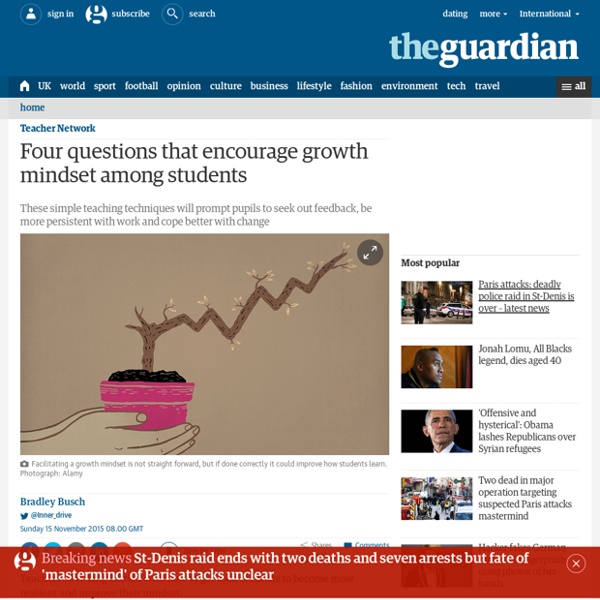How Does the Brain Learn Best? Smart Studying Strategies
In his new book, “How We Learn: The Surprising Truth about When, Where, and Why It Happens,” author Benedict Carey informs us that “most of our instincts about learning are misplaced, incomplete, or flat wrong” and “rooted more in superstition than in science.” That’s a disconcerting message, and hard to believe at first. But it’s also unexpectedly liberating, because Carey further explains that many things we think of as detractors from learning — like forgetting, distractions, interruptions or sleeping rather than hitting the books — aren’t necessarily bad after all. They can actually work in your favor, according to a body of research that offers surprising insights and simple, doable strategies for learning more effectively. Society has ingrained in us “a monkish conception of what learning is, of you sitting with your books in your cell,” Carey told MindShift. “How We Learn” presents a new view that takes some of the pressure off. Getting to Know Your Brain’s Memory Processes
Why grammar lessons should be renamed ‘understanding language’ | Mind your language | Media
Some of the country’s most eminent linguists came together for English Grammar Day, presented by UCL and Oxford University in association with the British Library, last week. With talks from grammarians including David Crystal and Dick Hudson, the event served as a crash course in the history, prevalence and importance of grammar. The main focus, however, was on the problems with how grammar is taught in schools. How things have to improve was made clear: we need to embrace grammar, teach it in context and uphold its importance within the education system. Using the word “grammar”, she said, can conjure off-putting images of an old-fashioned classroom. Crystal said: “You have to put the notion of grammar in the background. It’s not just grammar’s name that’s the problem. “Grammar needs context,” he said. Crystal said the work being done in classrooms across the UK to tackle such problems, and the people behind it, had shaped his own outlook and approach towards teaching grammar.
Ämne - Engelska (Gymnasieskolan)
Det engelska språket omger oss i vardagen och används inom skilda områden som kultur, politik, utbildning och ekonomi. Kunskaper i engelska ökar individens möjligheter att ingå i olika sociala och kulturella sammanhang och att delta i ett globaliserat studie- och arbetsliv. Kunskaper i engelska kan dessutom ge nya perspektiv på omvärlden, ökade möjligheter till kontakter och större förståelse för olika sätt att leva. Undervisningen i ämnet engelska ska syfta till att eleverna utvecklar språk- och omvärldskunskaper så att de kan, vill och vågar använda engelska i olika situationer och för skilda syften. Eleverna ska ges möjlighet att utveckla kunskaper om livsvillkor, samhällsfrågor och kulturella företeelser i olika sammanhang och delar av världen där engelska används. Undervisningen ska i allt väsentligt bedrivas på engelska. Kommentarer till texten Begrepp i det centrala innehållet kurs 5–7 Ämnesområden kurs 5–7 Komplexa och formella texter kurs 6–7 Annan fiktion kurs 5 Förhandlar kurs 7
Comparing the Book to the Movie
Watching a movie after reading the book is a wonderful way to encourage students to think critically about how each medium presented roughly the same information. Here are some questions to ask: Think about the setting of the book. Did the setting in the movie look like you had imagined it (Good ones for this are Harry Potter, Holes, Narnia, and Where the Wild Things Are)? You could also:Brainstorm all the ways the movie was different from the book.
Phonetic Alphabet
How to Improve Your English Pronunciation
“How can I improve my pronunciation?” This is one of the most common questions I am asked. I wrote this post to answer that question, and help you improve your English pronunciation! Good pronunciation is essential for speaking AND understanding spoken English. Below is a list of my best tips for improving your English pronunciation. 1. There are many different kinds of English accents. American pronunciation and British pronunciation are completely different. On this website, I teach general American pronunciation. 2. The International Phonetic Alphabet (IPA) is a collection of symbols that represent the different sounds of a language. American Pronunciation:An Introduction to the IPA British Pronunciation:BBC Learning EnglishInteractive IPA Chart 3. Say it right the first time. The more times you say a word incorrectly, the harder it becomes to learn to say it correctly. For example, let’s pretend you are reading a book and you see: outrageous. 4. 5. 6. 7. 8. Let’s be honest. 9.



